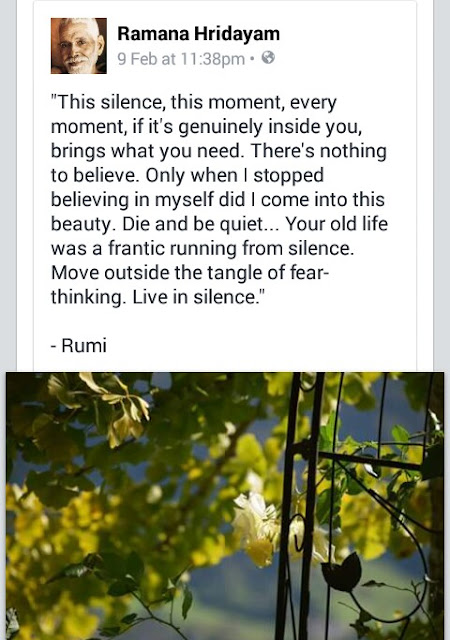M.: The Gita starts saying that you are not the body,
that you are not therefore the karta.(...he who does an act....)
Q.: What is the significance?
M.: That one should act without thinking that oneself is the actor.
The actions go on despite his egolessness.
The person has come into manifestation for a certain purpose.
That purpose will be accomplished whether he considers
himself the actor or not.
Q.: What is Karma yoga?
Is it non-attachment to Karma or its fruit?
M.: Karma yoga is that yoga in which the person
does not arrogate to himself the function of being the actor.
The actions go on automatically.
Q.: Is it the non-attachment to the fruits of actions?
M.: The question arises only if there is the actor.
It is being all along said that you should not consider yourself the actor.
Q.: So Karma yoga is kartrtva buddhi rahita karma -
action without the sense of doership.
M.: Yes. Quite so.
Q.: The Gita teaches active life from beginning to end.
M.: Yes, the actor-less action.
Q.: Is it then necessary to leave the home and lead a life of renunciation?
M.: Is the home in you? Or are you in the home?
Q.: It is in my mind.
M.: Then what becomes of you when you leave
the physical environment?
Q.: Now I see.
Renunciation is only action without the sense of being the karta.
Is there not action for a jivanmukta?
M.: Who raises the question? Is he a jivanmukta or another?
Q.: Not a jivanmukta.
M.: Let the question be raised after jivanmukti is gained,
if it is found necessary.
Mukti is admitted to be freedom from the mental activities also.
Can a mukta think of action?
Q.: Even if he gives up the action, the action will not leave him.
Is it not so?
M.: With what is he identified in order that this question might apply?
Q.: Yes, I see all right.
My doubts are now cleared.






























































